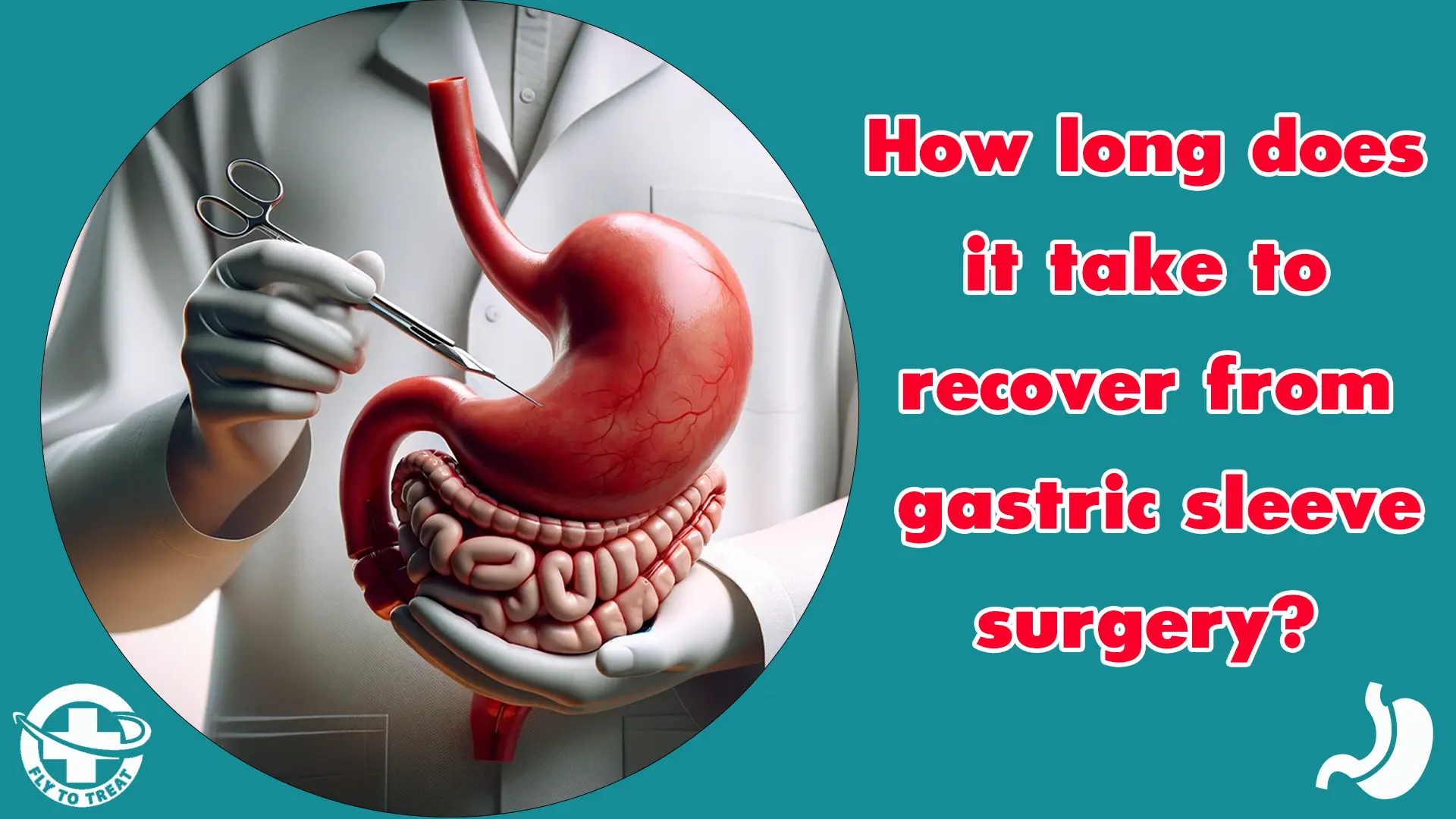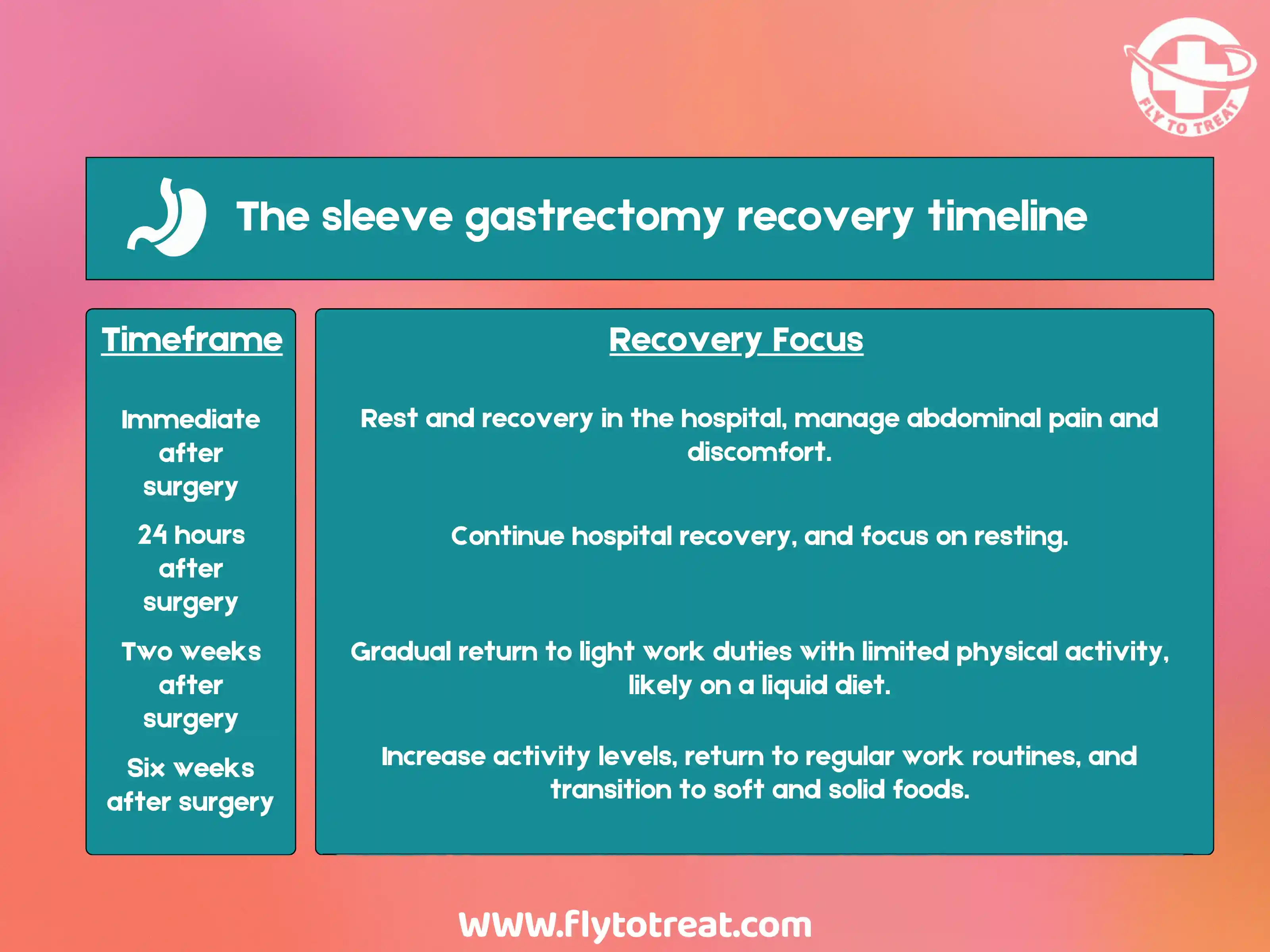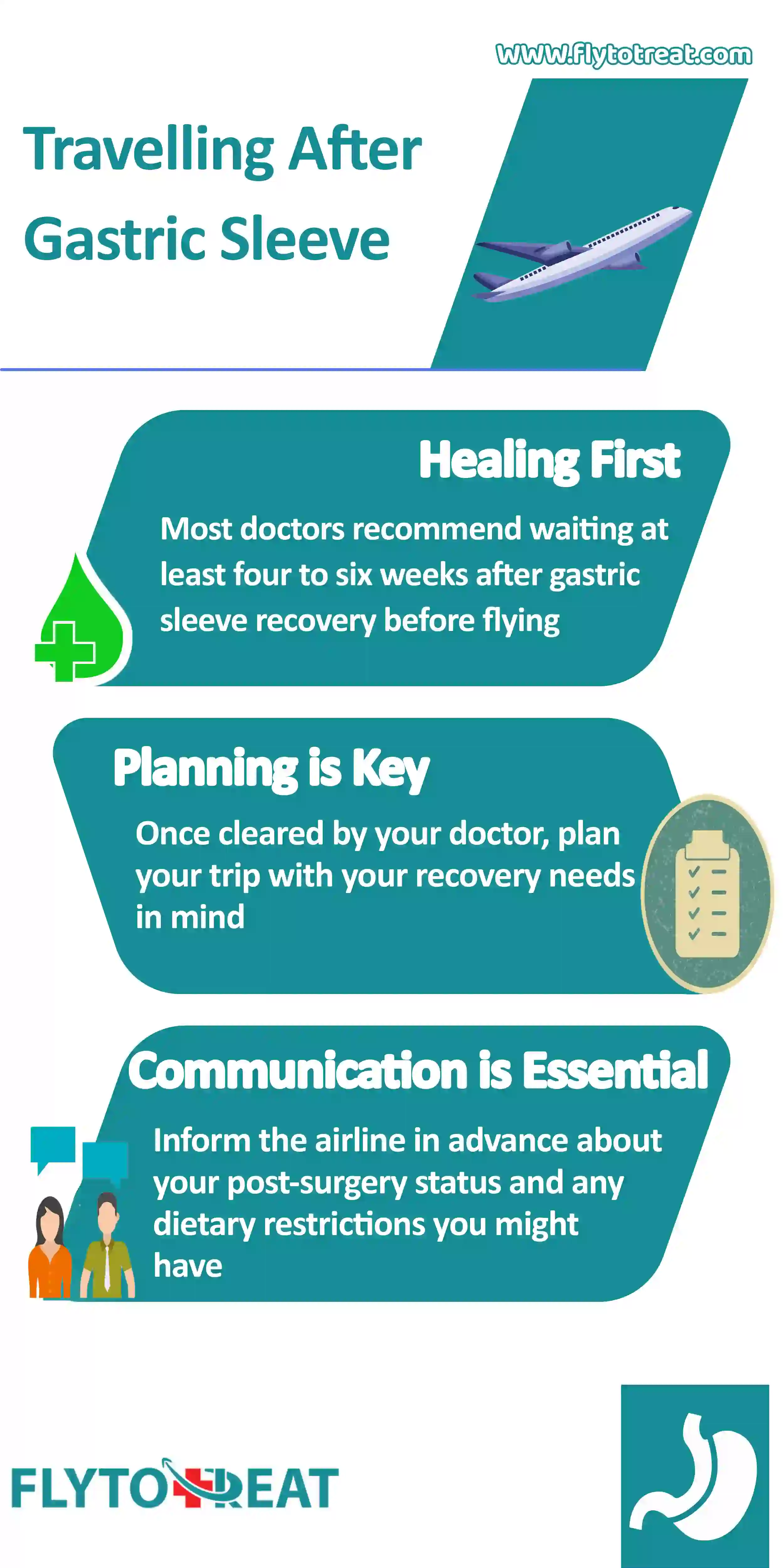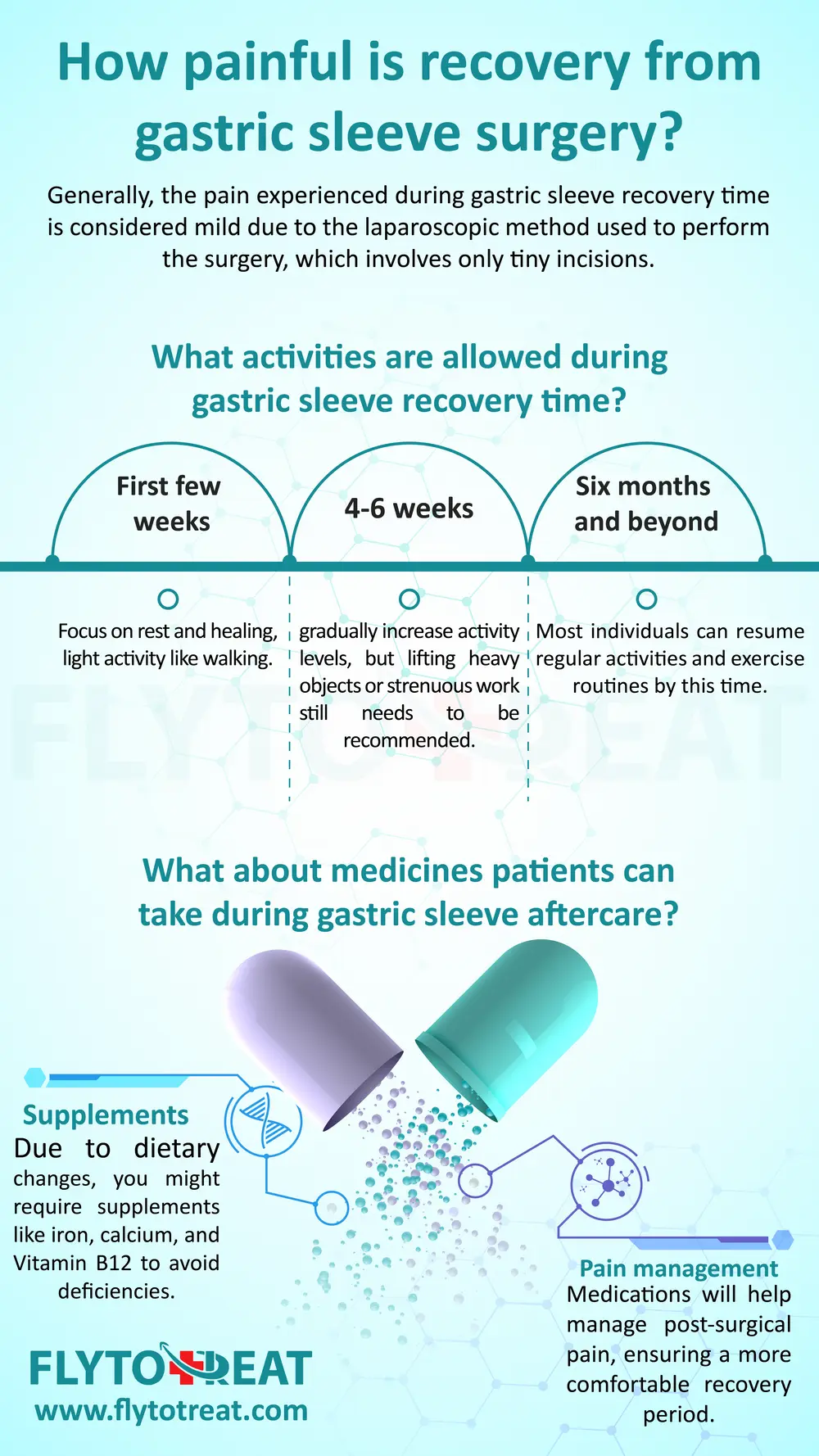
How long does it take to recover from gastric sleeve surgery?
Gastric sleeve surgery, or sleeve gastrectomy, marks the beginning of a significant journey toward weight loss and improved health for those struggling with obesity. As you delve into this article, prepare to uncover the essential phases of recovery post-surgery. We'll guide you through the initial days following the procedure, highlighting the key dietary adjustments necessary for healing and long-term success. Expect practical advice on gradually reintroducing physical activity, managing potential side effects, and maintaining emotional well-being. This comprehensive overview aims to equip you with the knowledge and confidence needed for a smooth transition into a healthier Lifestyle After Gastric Sleeve Surgery, ensuring you know what to anticipate at every step of your recovery.
Sleeve gastrectomy recovery timeline
While returning to work quickly may seem appealing, prioritizing your gastric sleeve recovery is crucial. Pushing yourself too soon can hinder your healing and potentially lead to setbacks. Listen to your body and prioritize rest, even if your employer pressures you to return before you're fully ready.
Understanding Recovery Stages and Timeframes:
• Immediately following surgery: Focus on resting and recovering in the hospital environment. You'll likely experience some general abdominal pain and discomfort; your doctor will prescribe medication.
• 2-week mark: You can gradually return to light work duties with limited physical activity. However, listening to your body and avoiding lifting heavy objects or strenuous tasks is essential. You'll likely be on a liquid diet during this time.
• 6-week mark: Many individuals can gradually increase their activity levels and return to their regular work routines. However, discussing this with your doctor and tailoring your return based on your progress is crucial. Following your nutritionist's guidance, you can eventually transition to soft and solid foods. Check out The Essential Guide to Gastric Sleeve Diet for a deeper exploration.
Communication is Key:
Open communication with your doctor is essential throughout your recovery. Discuss your specific work demands and limitations, and let them advise you on a safe and appropriate timeline for returning to work.
Remember:
• Recovery time varies: Everyone heals at their own pace. Listen to your body, and don't hesitate to adjust your work schedule based on your needs.
• Prioritize your health: Feel free to return to work before being physically and mentally ready. Consider discussing flexible arrangements or part-time work with your employer if needed.
• Follow your doctor's instructions: Attending all follow-up appointments and adhering to your doctor's recommendations are crucial for a smooth and successful recovery.
Additional details regarding post-surgery care at specific timeframes, including dietary restrictions and activity limitations, will be covered in the following sections.

What's the gastric sleeve recovery diet?
After gastric sleeve surgery, your surgeon will discuss your diet for 14 days. Here we delve into what and how much food you can eat or drink.
- Liquid food: At this point, you can eat a liquid diet. You will be able to eat solid foods later.
- Solid food: Talk to your surgeon about when you can alternate solid food and how you can do that. If you want to start solid food, start with a small portion. It can be excessive for your stomach. Softer foods like fish, potatoes, eggs, fresh fruit, and cheese would be recommended.
Protein: Protein is essential for your body, and when you start eating solid food, protein should be used in your diet at least five times a day.
Write down the foods you eat: If food causes discomfort for your body, write down what you did in your notebook and avoid eating it at other times.
Drinking water: Don't drink water and eat food simultaneously. It would be best to wait to drink water after your meal for at least 13 minutes.
Beverages: beverages such as beer, coke, and other non-alcoholic drinks should be eliminated.
Drinking alcohol: Before drinking alcohol, talk to your doctor. Some patients are not allowed to drink alcohol while they are in gastric sleeve recovery time.
Constipation: Some patients may experience constipation or bowel movements. In this case, please talk to your doctor. It may be necessary to change your diet.
How much can you eat after gastric sleeve?
The amount you can eat after gastric sleeve surgery changes over time. Initially, you'll focus on small amounts of liquids and gradually progress to small, protein-rich meals. Your doctor will guide you on portion sizes, which are typically much smaller than before surgery. Remember, it's about quality over quantity – focus on nutrient-dense foods to keep you feeling satisfied.
Travelling after gastric sleeve
Following a successful gastric sleeve surgery, you'll naturally be eager to explore the world anew. However, prioritizing a safe and comfortable recovery is crucial before air travel.
Healing First:
Most doctors recommend waiting at least four to six weeks after gastric sleeve recovery before flying. This allows your incisions to heal correctly and minimize the risk of complications like blood clots associated with prolonged sitting.
Planning is Key:
Once cleared by your doctor, plan your trip with your recovery needs in mind. Choose comfortable, loose-fitting clothing, and consider compression stockings to improve circulation during the flight.
Communication is Essential:
Inform the airline in advance about your post-surgery status and any dietary restrictions you might have. This ensures they can accommodate your needs and make your travel experience smooth and enjoyable.

What activities are allowed during gastric sleeve recovery time?
Gastric sleeve recovery requires dedication and a balanced approach to returning to your regular life. While the initial hospital stay is typically brief, a complete recovery takes several months.
Here's a timeline to keep in mind:
First few weeks: Focus on rest and healing. You'll likely experience some discomfort and be on a liquid diet. Gradually reintroduce soft foods as tolerated. Light activity like walking is encouraged, but avoid strenuous exercise. most patients can drive roughly 24 hours after the surgery
4-6 weeks: You may gradually increase activity levels, but lifting heavy objects or strenuous work still needs to be recommended. Continue adhering to your soft food diet.
Six months and beyond: Most individuals can resume regular activities and exercise routines by this time. You'll likely have transitioned to a regular diet, but remember to follow your doctor's and nutritionist's instructions for portion control and healthy eating habits.
What about medicines patients can take during gastric sleeve aftercare?
Following gastric sleeve surgery (sleeve gastrectomy), your doctor will likely prescribe specific medications to support your gastric sleeve recovery. These medications can address various needs:
Pain management: Medications will help manage post-surgical pain, ensuring a more comfortable recovery period.
Supplements: Due to dietary changes, you might require supplements like iron, calcium, and Vitamin B12 to avoid deficiencies.
Important Considerations:
Avoid certain medications: Some medications, like those containing iron or certain antibiotics, can irritate your digestive system after surgery. Your doctor will advise you on any medications to avoid or take cautiously.
Follow instructions carefully: Always adhere to your doctor's specific instructions regarding dosage, frequency, and administration of prescribed medications.
This information provides a general overview. It's crucial to consult your doctor for personalized recommendations on medications tailored to your individual needs and progress during your gastric sleeve recovery.
How painful is recovery from gastric sleeve surgery?
It is well-known that every surgery comes with some level of pain. Therefore, it is likely that patients will experience pain after undergoing gastric sleeve surgery. However, the degree of pain can vary from patient to patient. While some patients have a high pain tolerance, others may struggle with even mild pain. Generally, the pain experienced during gastric sleeve recovery time is considered mild due to the laparoscopic method used to perform the surgery, which involves only tiny incisions.
However, in some cases, patients may experience a significant amount of pain. They may need more potent painkillers during the first day after surgery. After that, with the help of painkillers prescribed by the surgeon, patients can experience minimal pain. It is expected to feel weak or tired due to consuming fewer calories during recovery. This discomfort should subside as your body adjusts to the new diet.
If you experience worsening pain, speaking with your doctor about possible causes and pain relief options is essential. Ultimately, any aches and pains should decrease as time passes, and you can resume your normal activities.

Can I drink alcohol during gastric sleeve aftercare?
While you might crave a drink after gastric sleeve surgery, it's generally recommended to avoid alcohol during the initial gastric sleeve recovery period. Here's why:
• Impaired Healing: Alcohol can hinder wound healing and potentially increase the risk of complications.
• Nutrient Absorption: Alcohol can interfere with absorbing essential nutrients crucial for your body's recovery.
• Dehydration: Alcohol is a diuretic, leading to dehydration, which can be especially detrimental during recovery when hydration is vital.
Long-Term Considerations:
Even after your gastric sleeve recovery time is complete, moderation is key. Alcohol can disrupt healthy eating habits and potentially contribute to Putting on weight after gastric sleeve. Consult your doctor for personalized guidance on alcohol consumption after surgery.
What can FlytoTreat do for a patient's gastric sleeve surgery recovery time?
FlytoTreat is a leading international medical tourism agency. If you're considering gastric sleeve surgery, we're here to provide comprehensive support throughout the entire process, from pre-operation to recovery.
While the surgery itself is straightforward, the recovery period and lifestyle adjustments play a crucialrole in ensuring optimal results. Our dedicated team is committed to assisting you every step of the way, offering guidance and assistance to help you
navigate the recovery process effectively.
Rest assured, our skilled surgeons and hospital staff network ensures top-notch care during your surgery. You can trust in the quality of healthcare you'll receive. Our knowledgeable team at FlytoTreat is available to offer valuable tips for a successful gastric sleeve recovery and to schedule consultations with our experienced surgeons. Feel free to ask any questions; our surgeons are here to address them.
Conclusion
Losing weight during the recovery period after gastric sleeve surgery can be an exciting experience for many patients who have been struggling with weight-related health issues for a long time. However, some patients may feel overwhelmed or frustrated due to the lifestyle changes they must make, such as regular exercise, following a healthier diet, and modifying their daily routine. This can be a big adjustment for some patients and may lead to disappointment in the outcome of the surgery. It's important to remember that the more effort you put in, the better the results you will achieve. Your recovery after gastric sleeve surgery can be very effective if you stay committed to the process and maintain healthy habits. Take your time with the changes you need to make. Your surgeon and healthcare providers can help you cope with these changes and provide support throughout your recovery period.
MEDICALLY REVIEWED BY: Dr. Ali Bazazi
AUTHOR: FlytoTreat's team of Authors
04 March 2024 - Updated At: 26 October 2024
Related Articles
Comment





